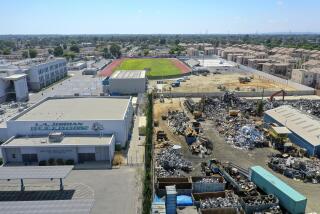Work paid off for Watts winners in national engineering contest
Julio Romero is an immigrant boy from El Salvador who spoke no English until he was 7 years old and attends a low-income, low-performing middle school in Watts.
But don’t tell him he can’t excel — not after he and three classmates just beat out teens from eight other states to win a national engineering contest.
Julio and his eighth-grade team from Markham Middle School — Danae Tousant, Ashley Baker and Jacqueline Sanchez — designed a prosthetic arm with a plastic water bottle, wire, metal rod and clamp. It picks things up and is cheap enough — less than $40 — for potential use by low-income people with disabilities. The students were also required to write a technical paper, give an oral presentation and create an academic display.
The eighth-graders hope their success changes perceptions of students from Watts.
“People think Watts is a dangerous ghetto place with lots of gangsters,” said Jacqueline, 14, who dreams of studying at Harvard University to become a pediatrician. “But just because we’re from here doesn’t mean we’re not smart.”
The students took top honors this month in the national competition by MESA USA, an organization that supports disadvantaged students to help them excel in math, engineering and science. Two Markham teachers, Oscar Espinoza and Philip Gerlach, started a MESA club after transferring to the school a few years ago. Markham’s club is affiliated with UC Irvine, which sends students to help Saturdays with engineering mini-competitions and team-building games. Most members are from Markham’s math and science magnet program, which Espinoza coordinates for 170 of the school’s 1,200 students.
It took several months of trial-and-error adjustments before the students developed their award-winning prosthetic device. The first design with two pieces of wood screwed together was too bulky, Julio said. The second design, attached to suspenders hooked to a back brace, took too long to put on — leaving only 30 seconds for the timed task of picking up tennis balls.
In the final design, the students got rid of the back brace, substituted a slim metal rod for the wood and found a better clamp. They had to perform such tasks with their device as throwing balls into a bucket and moving objects from one spot to another.
Staying the course wasn’t easy. The students poured 500 hours of work into the project, giving up time with family and friends. Once, Julio said, his sister teased him by texting a picture of the family enjoying pupusas at his favorite restaurant. Danae worked through her mother’s birthday.
But once the students began to win — they took first place in the preliminary, regional, state and then national level in Oregon — it all became worth it, they said.
“I feel like somebody now,” Jacqueline said.
Danae said the experience has deepened her ambition to major in math at UC Davis and become a forensic scientist.
Julio, who had dreamed of attending Stanford University and entering medicine, is now considering engineering.
And Ashley, who is interested in animation and art, said she now knows “I can do anything I put my heart to.”
“I just need determination,” she said.
More to Read
Sign up for Essential California
The most important California stories and recommendations in your inbox every morning.
You may occasionally receive promotional content from the Los Angeles Times.











